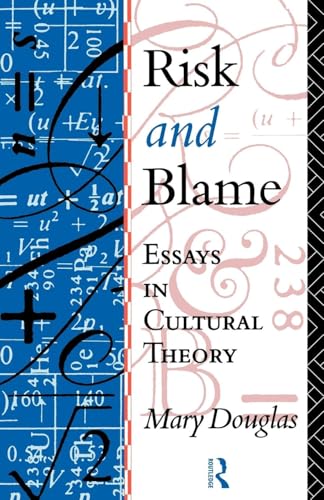Risk and Blame
Essays in Cultural Theory
Mary Douglas
BOOK REVIEW

The essence of society is an intricate dance between risk and blame, and Mary Douglas' Risk and Blame: Essays in Cultural Theory dissects this interplay with surgical precision. This book transcends mere academic inquiry; it unveils the very fabric of our cultural existence, offering readers an opportunity to deeply reflect on how we navigate the labyrinth of social norms and structures. 🌍
In a world where decisions carry monumental weight and consequences ripple through our communities, Douglas pulls back the curtain on how cultures interpret risk. Have you ever paused to consider how blame is often the backlash of societal expectations? In these essays, she provocatively articulates that the structures we blame for our misfortunes are often a reflection of our fears and perceptions rather than objective realities. This groundbreaking approach invites us to confront an uncomfortable truth: human tendencies towards blame can be both a survival mechanism and a societal downfall.
Douglas, a towering figure in anthropology, navigates through disciplines such as sociology and psychology, giving us insights that are timeless yet so relevant to the modern world's tumultuous landscape. The 1990s backdrop of Risk and Blame was not just a time of cultural and political upheaval but also one of burgeoning debates over risk management and individual responsibility-a discussion that echoes loudly in today's climate of heightened anxiety and blame culture surrounding issues like climate change and global pandemics.
Critics of Douglas may argue that her analysis leans too heavily on cultural constructs, potentially ignoring the objective elements of risk. They claim that while narratives of blame shape societal responses, it may not always cover the nuances of personal accountability. However, this criticism only serves to highlight the brilliance of her work; it forces a dialogue about where individual responsibility ends and cultural perceptions begin-one that every reader must wrestle with personally. ⚖️
Douglas' style is as engaging as it is enlightening, carrying you through a whirlwind of thoughts that range from reflective to provocative. Each essay builds upon a common theme: our understanding of risk is deeply rooted in social and cultural contexts. This concept is not merely theoretical; it drives home real-world implications. What does it mean for you when faced with difficult choices? Who do you blame when things go wrong? These questions are not just academic-they are personal. The reader can't help but internalize the lessons learned, which culminate in a compelling examination of one's own life experiences.
Moreover, Risk and Blame has shown its influence beyond academia, reaching into the realms of public policy and personal behavior. As leaders and individuals grapple with risk assessment today, Douglas' work serves as a guiding light. Think of how her insights have permeated discussions around responsibility in various sectors-healthcare, environmental policy, and even social justice movements. They serve as a foundation from which new ideas and approaches to risk can emerge, resulting in significant changes in how we define and respond to threats in our society.
The emotional journey that Douglas takes you on is undeniably palpable. As she reveals the endless layers of meaning behind societal norms, you might feel both discomfort and enlightenment-two feelings that often coexist in the face of truth. What's more, within this complex tapestry of risk and blame, there lies an opportunity for profound change. After all, once you recognize how blame can shape narratives, you're empowered to challenge them.
Can you afford to ignore the significant implications of this book? The insights in Risk and Blame invite you to examine the power structures and cultural narratives that govern society. Failing to engage means missing out on understanding not just the society around you, but also the interplay of your own personal interactions within it.
In essence, Mary Douglas doesn't merely offer theories-she ignites a revolution of thought that compels you to question, engage, and ultimately transform your perspective on life's most daunting issues. Thus, the book becomes not just a reading experience but a catalyst for a deeper reflection on our collective human experience. Don't let this opportunity pass you by; dive into Risk and Blame and confront the complexities of your own cultural narrative! 🧠✨️
📖 Risk and Blame: Essays in Cultural Theory
✍ by Mary Douglas
🧾 336 pages
1994
#risk #blame #essays #cultural #theory #mary #douglas #MaryDouglas